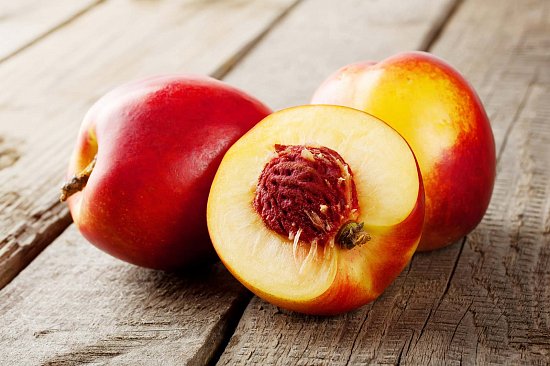The best thing that you can do for your body to saturate it with vitamins and minerals is to eat seasonal fruits and vegetables. One of the many summer fruits is a nectarine.

- Some people unknowingly often think that nectarine is a kind of hybrid of fruits (plum and peach, for example). However, the nectarine is actually the product of a peach mutation. It turns out that in the development of peach buds, certain mutations took place on trees, among ordinary peaches, hairless fruits – nectarines – appeared.
- Its name comes from the phrase – “food of the gods”. Moreover, in China, this fruit is a symbol of long life.
- Interestingly, nectarines can appear on peach trees, but not on nectarine peaches.
- The most delicious fruits grow closer to the trunk, so nectarines are best planted in the form of small trees or bushes.
- The calorie content of this product is 48 kcal per 100 g. It contains a lot of carbohydrates – 11.5 g, proteins – 9.8 g, and there are practically no fats – 0.2 g.
- Its pulp is saturated with such useful substances as iron, phosphorus, potassium.
- It contains malic and citric acids, as well as glucose, fructose, and sucrose. It has significantly less sugar than a regular peach. It also contains pectin, which is an important component in the fight against cancer.
- In addition, nectarines can have a positive effect on gastrointestinal problems, helping in the digestion of food.
- Nectarine helps to retain moisture in tissue cells. Accordingly, it is a prophylactic agent for skin aging and first wrinkles.
- It is a powerful antioxidant, helping to contain the negative effects of the environment. Speeds up metabolism.
- Pharmacology: Nectarine is used in the manufacture of conventional activated carbon, as well as its cores are used for ointments and other drugs.
- Store ripe fruit in a cool, dry place for several days. It will mature even more over time, so don’t store the nectarines for too long. Can also be refrigerated to extend shelf life, but nectarines taste best at room temperature.
- Sliced fruits should always be kept in the refrigerator in a closed container, or they can be frozen and stored in freezer bags or frost-resistant containers for later use on baked goods and smoothies.

